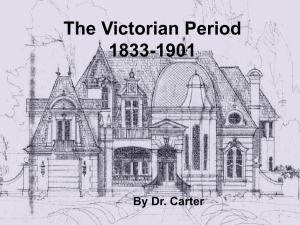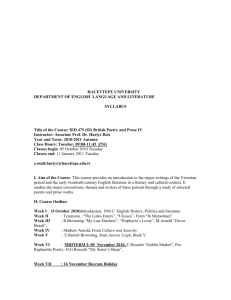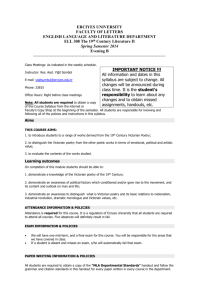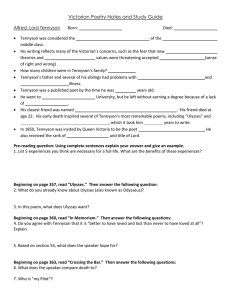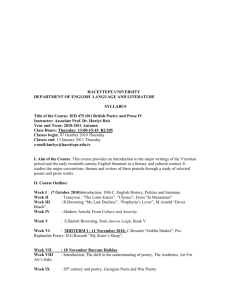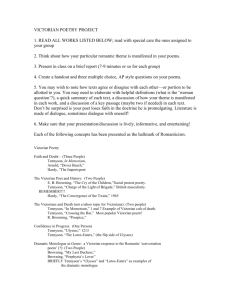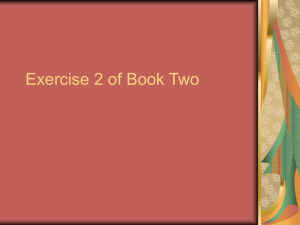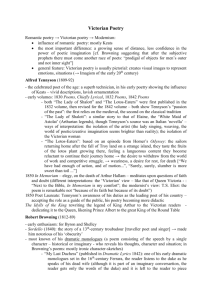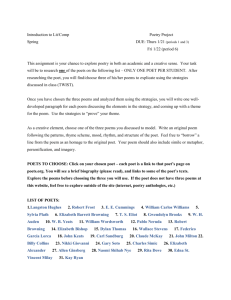File
advertisement
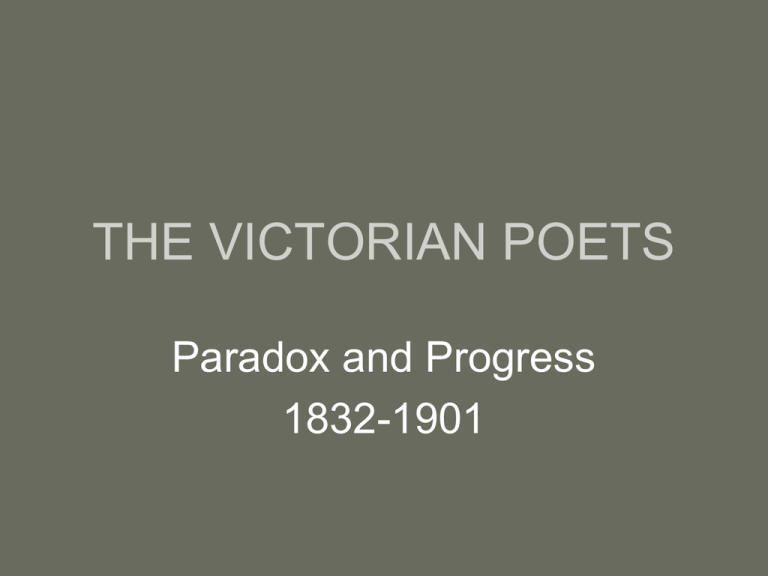
THE VICTORIAN POETS Paradox and Progress 1832-1901 Novels • • • • Increasing importance of the novel Dickens: Hard Times; Great Expectations Anthony Trollope: Barchester Towers Charlotte Bronte: Jane EyreEmily Bronte: Wuthering Heights • George Eliot: Middlemarch Thomas Hardy: Tess of the D'Urbervilles Poetic concepts • Realism: capture every day life • focused on effects of Industrial Revolution • social problems brought to public attention • Psychological Realism: inner realities of the mind • a blend of Romanticism and realism • Naturalism: nature and society are indifferent to human suffering • Loved heroic, chivalrous tales of honor • reclaiming of the past CENTRAL POETS • • • • • • Alfred, Lord Tennyson Charles Dickens Robert Browning Elizabeth Barrett Browning Gerard Manley Hopkins Thomas Hardy (1809-1892) (1812-1870) (1812-1889) (1806-1861) (1844-1889) (1840-1928) ALFRED, LORD TENNYSON • THE MOST POPULAR POET OF HIS DAY & POET LAUREATE AFTER WORDS-WORTH, HIS FAME WAS ENHANCED BY HIS COLORFUL APPEARANCE. TENNYSON (cont.) • TENNYSON WROTE IN A DIGNIFIED BLANK VERSE THAT HE WORKED HARD TO DEVELOP, AND HE WAS ESPECIALLY INSPIRED BY THE CLASS-ICAL PAST. TENNYSON (cont.) • HIS MIND WAS DRAWN TO STATES OF WEARINESS & MELANCHOLY ISOLATION THAT WERE A COUNTERPOINT TO THE ENERGY & DYNAMISM OF THE AGE. ROBERT BROWNING • INFLUENCED BY PERCY SHELLEY, AT AGE 14 HE BECAME AN ATHEIST & A LIBERAL, THOUGH HE LATER GREW AWAY FROM BOTH. BROWNING (cont.) • EARLY IN HIS CAREER HE WAS MUCH LESS APPRECIATED AS A POET THAN HIS WIFE, ELIZABETH BARRETT, BUT BY THE 1860S HE WAS CONSIDERED THE RIVAL OF TENNYSON. BROWNING (cont.) • BROWNING IS ESPECIALLY REGARDED FOR HIS INNOVATIONS IN THE DRAMATIC MONOLOGUE, IN WHICH THE WORDS OF A SPEAKER OTHER THAN THE POET MUST BE ANALYZED TO DETERMINE THE POET’S MEANING. BROWNING (cont.) • UNLIKE TENNYSON’S SMOOTH, POLISHED, ELEVATED VERSE, HIS STYLE IS VERY UN-VICTORIAN, BEING DIS- CORDANT, COLLOQUIAL, & FULL OF UNEXPECTED JUXTAPOSITIONS. BROWNING (cont.) • THOUGH SEEMINGLY UNLIKE OTHER VICTORIAN POETS, HE HAS MUCH IN COMMON W/ PROSE WRITERS OF THE DAY IN HIS EMPHASIS ON THE GROTESQUE & ON REVEALING THE COMPLEXITY OF HUMAN MOTIVES & THE WORKINGS OF THE MIND. BROWNING (cont.) • PROBABLY HIS MOST VICTORIAN QUALITY IS HIS EXUBERANCE & ENERGY. Elizabeth Barrett Browning Education • Elizabeth was educated at home. • She had read passages from Paradise Lost and a number of Shakespearean plays among. • Written her first "epic" poem, which consisted of four books of rhyming couplets. Old Testament • She taught herself Hebrew so that she could read the Old Testament; her interests later turned to Greek studies. • Accompanying her appetite for the classics was a passionate enthusiasm for her Christian faith. Poems con. • In 1826 Elizabeth anonymously published her collection An Essay on Mind and Other Poems. • During this time, she wrote The Seraphim and Other Poems (1838). Obituary • In 1846, the couple eloped and settled in Florence, Italy. • Elizabeth’s father never spoke to her again. Sonnets • Elizabeth's Sonnets from the Portuguese, dedicated to her husband and written in secret before her marriage, was published in 1850. GERARD MANLEY HOPKINS • A CATHOLIC PRIEST & ONE OF THE GREATEST VICTORIAN POETS, HE IS KNOWN FOR HIS EXPERIMENTS W/ LANGUAGE & RHYME & ESPECIALLY “SPRUNG RHYTHM.” HOPKINS (cont.) • IN SPRUNG RHYTHM, LINES HAVE A SET NUMBER OF STRESSES, BUT THE NUMBER & PLACEMENT OF THE UN- STRESSED SYLLABLES VARIES GREAT-LY. HOPKINS (cont.) • REGARDED AS A PIONEER OF MOD- ERN LITERATURE, HIS POEMS WERE NOT PUBLISHED UNTIL ALMOST 30 YEARS AFTER HIS DEATH. Thomas Hardy •Born in 1840, Thomas Hardy became known as a prominent novelist and poet in British and American literature. •He published 8 volumes of poetry, one being published posthumously. •Hardy’s poetry is commonly referred to as pessimistic and was not received well during his lifetime. •One of the most common elements seen throughout Hardy’s poetry is his use of autobiographical information within the poems Disillusioned Love “Neutral Tones” In Hardy’s earlier works, this was a favored theme. Love was never reciprocated or happy, but tedious and marked with infidelity. The poems of 1912-1913 written after Emma’s death are also considered love poems. Religion/Loss of Faith “The Oxen” Hardy was a pronounced agnostic during his later life. His poetry is marked with his disbelief in God and a belief in some other ruling force within the universe. In some ways, Hardy needs the basis of belief to show disbelief in his poetry. Chance and Coincidence “Hap” Hardy’s most discussed and most widely used theme is that of chance and coincidence. One entire volume of poetry is devoted to the “Satires of Circumstance.” For Hardy, there was no omniscient ruling power of the universe. The experiences in one’s life were a result of Chance and Coincidence.
